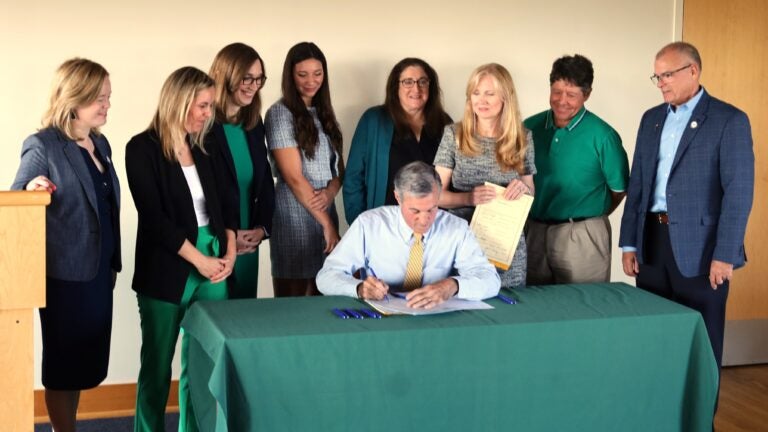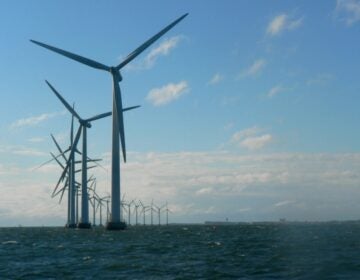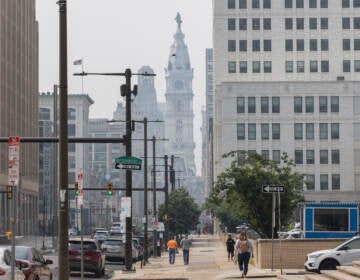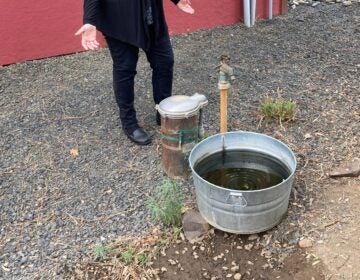‘No joke’: Delaware adopts new laws on offshore wind, electric vehicles and more to fight climate change
Delaware is the lowest-lying state in the U.S., leaving it vulnerable to the effects of climate change, lawmakers and advocates say.

Gov. John Carney signs climate change legislation surrounded by members of the Delaware General Assembly at the DuPont Environmental Education Center on Sept. 5, 2024. (Sarah Mueller/WHYY)
This story is part of the WHYY News Climate Desk, bringing you news and solutions for our changing region.
From the Poconos to the Jersey Shore to the mouth of the Delaware Bay, what do you want to know about climate change? What would you like us to cover? Get in touch.
This story was supported by a statehouse coverage grant from the Corporation for Public Broadcasting.
Delaware is one step closer to building offshore wind as several climate bills became law earlier this month.
The Delaware Energy Solutions Act of 2024 creates a framework for Delaware to request and approve offshore wind projects. The federal government, under the Bureau of Ocean Energy Management, designates offshore wind sites and oversees auctions. While projects moved forward in neighboring New Jersey and Maryland, Delaware had been the only coastal state along the Eastern seaboard without a process to approve offshore wind projects.
This month, the federal government approved US Wind’s Maryland Offshore Wind Project off the Delmarva coast, which it said will generate enough electricity to power 718,000 homes.
The project would run power export cables under Delaware-regulated wetlands, state waters and the Indian River Bay. The application has drawn considerable opposition, with some saying it could hurt tourism and harm native wildlife.
Bill sponsor state Sen. Stephanie Hansen said she understands those fears but believes the turbines will actually draw people to the area.
“I think they’re afraid of it because they’re worried about what it’s going to look like,” she said. “What we could do is take a look at how it’s been received in other areas that actually do have offshore wind turbines. It actually increases tourism.”
Hansen said embracing wind energy is important for the First State because it’s the lowest-lying state in the United States, so other renewable sources like hydroelectric and nuclear aren’t good alternatives.
“Climate change is no joke,” she said. “It’s big, it’s overwhelming at times, but we have now as a state picked up our laboring oar and we are rowing in the right direction.”
Climate legislation also signed by Gov. John Carney this month requires local governments to take climate change and sea level rise into account in their future land use plans. The bill has proved to be controversial because it could limit the development of certain properties. It won’t take effect until November 2026.
The other measures include giving residents rebates for buying and installing electric vehicle charging equipment and requiring certain state cars and trucks be zero emissions by 2040.
Democratic state Sen. Sarah McBride, who is running for Delaware’s lone Congressional seat, said lawmakers have made electric vehicles more accessible and affordable.
“The shift toward electric vehicles is not ideological,” she said. “It’s imminent and it’s inevitable, but it’s important for state government to demonstrate to consumers across this state that we are leading the charge in adopting that shift.”
McBride, who could be the first openly transgender person to serve in Congress, is facing Republican James Whalen IIII, a retired state police officer and business owner from Millsboro in November.
Another measure that is now law requires new schools and state buildings over 50,000 square feet to install roofs that would accommodate solar arrays. It would apply to all building permit requests submitted on or after Jan. 1, 2030.

Get daily updates from WHYY News!
WHYY is your source for fact-based, in-depth journalism and information. As a nonprofit organization, we rely on financial support from readers like you. Please give today.







